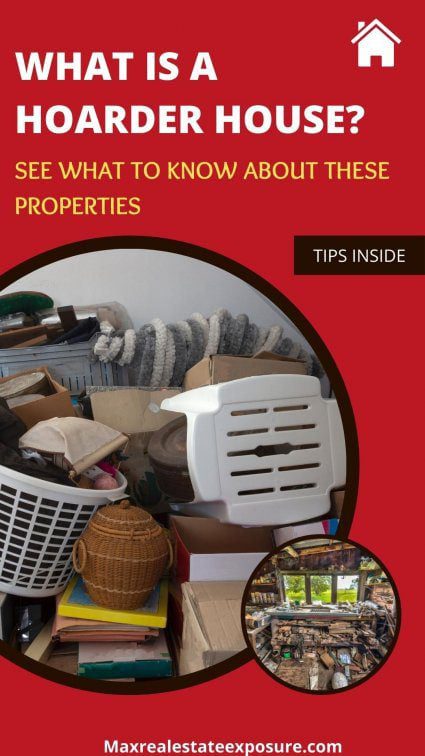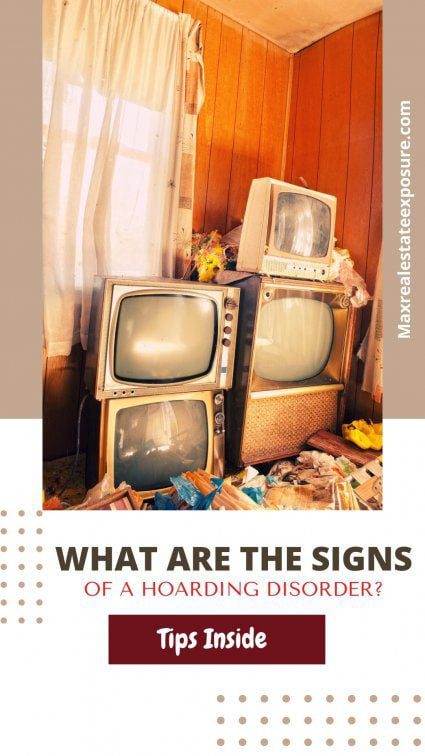 Have you ever heard the term “hoarded house” and wondered what it meant? A hoarder house is a property that a homeowner or tenant has overfilled with excessive personal items.
Have you ever heard the term “hoarded house” and wondered what it meant? A hoarder house is a property that a homeowner or tenant has overfilled with excessive personal items.
Hoarding can occur in a single-family home, condo, townhouse, or apartment.
Hoarding disorder is a mental problem that causes people to accumulate excessive amounts of clutter and junk. It’s become such a fascinating topic that there is now a popular television series called Hoarders.
A hoarder finds it extremely challenging to part with anything. When one has a hoarding illness, thinking about giving up any items, whether they hold value or not, causes extreme stress.
Hoarding can become so bad it leads to severe health problems and social isolation.
A hoarder house is often used to describe a home that has fallen into chaos because the owners have accumulated an overabundance of disorganized items, most of which hold no value.
Almost everything has sentimental value with a hoarder.
As a Massachusetts Realtor, I have sold several of these properties over the three decades I’ve been in the real estate industry. Due to their nature, they can be challenging sales. It takes a special agent to be able to deal with the intricacies of these sales.
Let’s have an in-depth look at everything to know about hoarder houses.
What is a Hoarder?
Hoarders keep anything and everything. They may collect food, newspapers, magazines, household items, clothing, boxes, and other knickknacks.
A hoarded house contains so much clutter and garbage that there is usually only a narrow path through the property’s rooms.
Countertops, sinks, stoves, desks, and stairways are usually cluttered with an unfathomable amount of things.
Once there is not enough room inside the home, a hoarder may continue to spread out into other areas of the property, such as the garage, storage sheds, and yard.
There is a persistent difficulty in getting rid of anything. Almost everything has sentimental value with a hoarder.
Hoarding is a mental illness that will need to be treated by professionals. Those with a hoarding disorder may also have an obsessive-compulsive disorder (OCD).
It’s estimated that a hoarding disorder affects two to six percent of the population. Family members are usually the first to notice there is a mental disorder that will probably need professional help.
A Hoarder House Creates Dangerous Living Conditions
Hoarders often live in houses with dangerous conditions, leading to health problems for the hoarders and their residents.
Firefighters often advise people to keep combustible materials out of their homes. It would not be unusual for a hoarder to keep flammable products or gasoline on the property, as the conditions in a hoarder’s house often create fire hazards.
The clutter in the home can make it more difficult to escape if exits and entrances are blocked or if people inside are likely to trip.
Rodents, flies, and cockroaches are also attracted to houses in a hoarding condition, mainly if there is rotting food and feces around the house.
The Impact on Neighbors and Communities
Hoarded houses pose significant risks to the occupants and have far-reaching effects on the surrounding neighborhood. These properties can become a blight, affecting the aesthetic and safety of the entire community.
The accumulation of items can increase fire risks, attract pests, and create unsanitary conditions that may spill over to neighboring properties. Moreover, hoarder properties can decrease home values in the vicinity and lead to potential legal issues for the hoarder.
Communities must approach these situations with empathy and understanding. It is essential to recognize hoarding as a mental health issue. Collaborative efforts between neighbors, local authorities, and mental health professionals can provide the support needed to address the root causes of hoarding. This assists in the cleanup and recovery process.
These Houses Create Health Problems
 A hoarder not only has a mental illness, but their issue can bring on further health problems.
A hoarder not only has a mental illness, but their issue can bring on further health problems.
Many people living in hoarder houses suffer from poor health because of the conditions inside the homes. The clutter makes cleaning challenging for occupants of a hoarder house.
Some hoarders live in properties known for excessive dust, overflowing garbage, and mold and mildew in kitchens and bathrooms.
Those who visit a hoarder house with pets may find unsanitary conditions such as pet hair, urine, and even feces throughout the property. The smell can often be unbearable.
Many residents in hoarder properties breathe air contaminated with harmful chemicals, which can lead to respiratory problems and a decline in their health over time.
In hoarder homes where regular home maintenance has ceased, unusable toilets can be caused by objects that have fallen into them, lice on bedding, chewed-through electrical wires from rats, rotting food, and flea and rodent infestation.
Hoarders Who Have Died in a House
If things get bad enough, people can die from living in a hoarded house. It doesn’t sound pleasant.
If you are considering buying a hoarder house, here are some methods to see if someone died on the property. It is a morbid thought, but it does happen.
House hoarders often suffer from numerous health conditions due to their environment.
There Are Five Levels Of Hoarding in a House
The Institute of Challenging Disorganization has created a chart of five levels of hoarding, from minor to severe.
Level One
A level one hoarder house has only a small amount of clutter and little to no odors.
Level Two
Level two hoarders have started to accumulate junk that is beginning to block living areas, with noticeable odors. Pet feces is often on the floor, and evidence of household rodents is present.
Level Three
A level three hoarder often has one bedroom and bathroom that have accumulated so much stuff that they are unusable. The countertops are often garbage-filed, and garbage cans are filled.
Level Four
A level four hoarder home will have excessive pests, animal sanitary problems, and rotting food added to the above hoarding, as seen in levels one to three. There are strong odors that can be nauseating. Sometimes, there is also animal hoarding.
Level Five
A level five hoarder house is the worst of all the afflictions. Most of the entryways and exits have been blocked off by junk.
Unfathomable levels of clutter create toxic conditions, and health problems are often evident in anyone living in the home.
What Are The Symptoms of a Hoarding Disorder?
 Those who end up with a hoarded house have early warning signs.
Those who end up with a hoarded house have early warning signs.
Hoarding disorder is a mental health condition characterized by an excessive accumulation of items. It typically surfaces during the teenage to early adult years and leads to difficulty discarding things and cluttered living spaces.
As people age, they typically acquire things without immediate need or space.
Middle age is when symptoms can be severe and challenging to treat.
Problems with hoarding gradually develop over time and tend to be a private behavior. Most of the time, significant clutter is built up when family and friends notice it.
What Causes House Hoarding Disorder?
Hoarding disorders start with extreme feelings of not wanting to throw anything away. Those afflicted begin to believe that their things are unique and will be helpful in the future.
Often, the items can represent something of emotional significance or happier times. The things they accumulate make them feel safer and wanted.
Sometimes, there is a family history of others who have been hoarders. A life-altering event, such as death, could have triggered the hoarder’s mentality.
Hoarding is also associated with those who have an obsessive-compulsive personality disorder or depression. Studies into Genetics, brain functioning, and stressful life events are being conducted as possible causes of hoarding.
A house hoarder should not be confused with a collector, who is very different. People with hobbies such as comic books, stamps, coins, or other items seek out such items.
These collectibles don’t create a situation where a property becomes cluttered or unsanitary.
Understanding the Psychological Factors Behind Hoarding
Hoarding disorder encompasses a complex array of psychological components, including attachment issues, perfectionism, decision-making problems, and anxiety disorders.
These factors contribute significantly to the extreme accumulation behavior observed in individuals suffering from this condition. Recognizing these underlying causes is crucial for providing empathetic support and effective interventions.
For instance, hoarders often have emotional attachments to possessions, a need for a sense of control, and a fear of letting go. These traits often lead to a disorganized living space, which significantly impacts the individual’s quality of life.
Unlike collectors, who seek and value specific items, hoarders experience distress and impairment due to their extensive accumulation. Addressing these psychological factors is vital to helping individuals with hoarding disorder reclaim their living spaces and improve their overall well-being.
What Are The Downsides of a Hoarder’s House?
When someone becomes a hoarder, their life can become a constant battle against clutter. This often leads to financial distress because hoarding makes it challenging to buy necessary items.
People with hoarding disorder may experience strained relationships due to the potential for loss of housing if they are evicted or condemned.
Children of people with a hoarding disorder may experience depression or another mental condition because of the cluttered and overwhelming environment they live in.
Some adolescents and teenagers may avoid inviting their friends or relatives to their house out of embarrassment from a hoarding parent.
Children can resent their parents for the unhealthy lifestyle the hoarding creates, while others may be removed from the home to escape health hazards.
A hoarded house can also severely impact its market value. Even homes with minor clutter will sell less than turnkey properties.
Hoarder houses are often labeled as fixer-upper properties due to the awful conditions. When listing these homes, you must have a firm grasp on selling homes in poor condition.
How is a Housing Hoarding Problem Treated?
As mentioned, a hoarder house is a mental illness that needs to be addressed by a doctor or health specialist who deals with this type of affliction.
A licensed mental health professional makes the diagnosis of hoarding. Professionals who might specialize in diagnosis include a psychiatrist, counselor, psychologist, or clinical social worker.
It is essential when hoarding is noticed to have the hoarder get assistance. According to the American Psychiatric Association, hoarding disorder is often treated using cognitive behavioral therapy (CBT).
Some communities have health agencies that deal with hoarding problems. Local or county government resources may be available to help solve this problem.
If your loved one’s hoarding disorder is causing them to endanger their health or safety, you may need to contact local authorities.
In some high-level circumstances, it may be necessary to notify the police, fire department, child or elder protective services, or animal welfare agencies. These agencies can help hoarders and anyone living with them.
Can a Hoarder House Be Condemned?
It is possible that a local board of health could close a property if the conditions get bad enough. If garbage, trash, and other debris in someone’s yard impacts others, it’s more likely.
A person with this level of hoarding could be labeled a bad neighbor. When it gets bad enough to affect neighborhood property values, action can be taken.
Legal and Municipal Responses to These Homes
In response to the challenges posed by hoarder homes, various municipalities have enacted ordinances and regulations to address and mitigate these situations. These legal frameworks seek to balance the need for public safety and welfare with the individual’s rights.
For example, some cities have established procedures for forcibly removing garbage from hoarder properties when it poses a significant health or safety risk.
Additionally, programs are in place to assist hoarders with cleanup efforts. They sometimes offer financial aid for those unable to bear the cost. Understanding these legal and regulatory responses is crucial for hoarders and their neighbors. It outlines the potential consequences of hoarding and the support available for recovery.
Getting a Hoarder House Cleaned
 Once a hoarder has recognized they have serious health problems, they can be addressed. Most hoarder houses must be dealt with professionally to be adequately cleaned up.
Once a hoarder has recognized they have serious health problems, they can be addressed. Most hoarder houses must be dealt with professionally to be adequately cleaned up.
The best option is to attack the problem on multiple levels.
There are often multiple professionals who will need to be called in, including:
- A professional junk removal service. There are many excellent junk removal companies. 1-800-Got-Junk is one of these, and it is located in the United States.
- Donation pick-up services—Some items a hoarder has collected will hold some value. In this instance, you can have one of the recognizable charities pick up these items.
- If you have excess furniture, you may want to consider getting a storage unit nearby. Some folks even hire a professional organizer.
- Professional cleaning service—Once all of the clutter has been removed from the property, an experienced professional cleaning company should be brought in. The company should scrub all the surfaces on the property, including woodwork and flooring.
- A mold remediation professional—If the home has been contaminated with mold, a professional in that industry will need to perform remediation services.
- Professional pest treatment – if there are bugs and rodents, professional pest extermination must be conducted.
When selling a hoarder’s house, these steps will be necessary to get the fair market value. Without addressing these issues, a hoarder’s property will sell for a fraction of what it should.
The average cost to clean a hoarder’s house can be as high as two dollars per square foot. It’s hard work getting these properties into better condition.
Real Estate Professionals Can Encounter Hoarders Properties
A real estate agent can be hired to sell a hoarder’s home. Hoarders’ homes are incredibly challenging to deal with just by nature. You are an entire house filled with stacks of clutter but also someone who has a mental health issue.
Most of the time, real estate agents have another family member helping with the sale. Financial strain often leads to further stress from these types of properties.
Who Buys Hoarder Houses?
In some circumstances, the steps described above cannot be taken to clean up a hoarder’s house. When a property is sold as-is, the buyer pool shrinks considerably in such cases.
It often leads to a cash sale from real estate investors or contractors. Companies like We Buy Ugly Houses look for distressed properties to purchase, such as hoarder homes. They will make a cash offer and close quickly.
Many of these We Buy Houses for Cash companies would love to buy a hoarder’s home.
These companies will purchase properties cheaply and then fix them up. After a complete makeover, they will be flipped for a profit.
Selling to an investor is not the way to maximize your profits. If you research, you’ll notice these properties sell for a lot less when left in hoarded condition.
If you’re not an investor, you may need rehab loan financing to buy one of these properties. Given the likely poor condition, an FHA 203k loan could be a good financing option.
How to Find a Hoarders House For Sale Near Me?
Is it possible to find hoarders’ houses nearby? Yes, although it is not particularly easy.
If you are a contractor or in the business of flipping Google, you can try doing a Google search for a hoarder’s house near me or a hoarder house for sale. Google can pick up on MLS descriptions within popular real estate websites that describe such properties.
You can also try driving around yourself, which is much more challenging. Some characteristics to look for include unkempt properties, excessive trash, overflowing mail, blocked windows, and lots of collected debris around the yard.
Conclusion
Hoarding is something that should be treated seriously. Mental health disorders are a problem that should be addressed when signs first appear. If you have a friend or relative hoarding things in their home, try to get them some help.
About the Author: Bill Gassett, a nationally recognized leader in his field, provided the above real estate information on what to know about hoarder houses. Bill has expertise in mortgages, financing, moving, home improvement, and general real estate.
Learn more about Bill Gassett and the publications in which he has been featured. Bill can be reached via email at billgassett@remaxexec.com or by phone at 508-625-0191. For the past 38+ years, Bill has helped people move in and out of Metrowest towns.
Are you thinking of selling your home? I am passionate about real estate and love sharing my marketing expertise!
I service Real Estate Sales in the following Metrowest MA towns: Ashland, Bellingham, Douglas, Framingham, Franklin, Grafton, Holliston, Hopkinton, Hopedale, Medway, Mendon, Milford, Millbury, Millville, Natick, Northborough, Northbridge, Shrewsbury, Southborough, Sutton, Wayland, Westborough, Whitinsville, Worcester, Upton, and Uxbridge Massachusetts.

